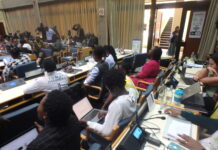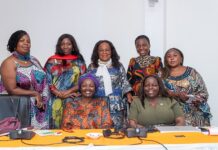
By Clifford Akumu
Narok County, Kenya: From celebrating culture to highlighting and fighting gender-based violence and cultural norms, indigenous bead makers from Narok, Kajiado, West Pokot, Turkana, Marsabit, and Samburu are creating beads with a new meaning.
The colourful beads occasionally swayed by the humid wind on Faith Latayien’s forehead are a spectacle.
The 22-year-old, from Olekipakei village in Loita division, Narok County has colourful earrings to match.
Latayien further punctuates her elegance with a unique bracelet. Like other women and girls in Olekipakei village, she has added beauty with a new unique bead, the Johari bead bracelet- for a worthy cause.
In her remote village bordering Tanzania, each bead has an in-depth meaning. For example, unmarried Maasai girls wear a large flat beaded disc that surrounds the neck while the married ones display their status by wearing Nborro- which is a long necklace with blue beads.
And now, the Johari bead bracelet too has found a new meaning, this time as a symbol to fight all forms of sexual and gender-based violence among the pastoral communities where the practice is still rampant.
“We are using the Johari bead to create awareness about the dangers of Sexual and Gender-Based Violence, anybody who sees you wearing it will now know that you do not tolerate retrogressive vices against women and girls such as female genital mutilation,” Latayien begins.
Latayien has not undergone FGM. But some of her friends in school, have passed through the harrowing experience, she offers. She says that she is out to educate other girls to stand firm on issues of SGBV.
“In my family, nobody has received the cut. We thank our parents for being steadfast against the practice,” she explains as she receives a colourful Johari bead bracelet from her mother Juliana Naini, the founder of Maasai Treasures Group-a bead making group using the initiative to fight for the rights of girls and women in Olekipakei community.
For the longest time, the fight against female genital mutilation has been hindered by retrogressive cultural beliefs, however, women in pastoralist communities of Narok, West Pokot, Samburu, and Kajiado have now found a new way to empower themselves economically as well as socially through a cultural practice that has been with them for ages.

The women, some of them ex-cutters who were revered within the community for their special circumcision activities, have now reformed and resorted to making and selling Johari beads to fight FGM and improve their livelihoods.
Juliana Naini is the chairlady of Maasai Treasures–a bead-making group she founded in 2015 with only five ladies. She took up bead making as a hobby, but now she uses the initiative to fight for the rights of girls and women.
When Naini was a little girl her grandmother taught her how to bead and sew.
“As a child, I used to play around local women doing beadwork. I would sit next to them and copy what they were doing. And immediately they left the place, I could collect all the leftover beads and make similar designs,” Naini tells Talk Africa at her home in Olekipakei village in Loita, Narok County.
And that is how she developed an interest in bead making and a career born out of it. “Since that time, the only work I enjoy doing is beadwork. I work until 1 pm at night,” says Naini. Beadwork is mostly done at night where the women gather around to create their masterpieces.
Ever since creating beads inspired by her Maa heritage has helped the 40-year-old navigate life’s ups and downs.
“My culture influences every beadwork I make,” explains Naini, a mother of three.
Maasai Treasures, now comprising of 21 members, are part of the Ushanga initiative that seeks to transform the traditional ornamental bead making by women among the pastoralist communities into viable enterprises.
Partnerships
Ushanga has partnered with United Nations Population Fund (UNFPA), the Government of Kenya, and EcoBank to launch Johari Beads specifically towards empowering women economically and building their capacity as champions towards ending FGM in their communities.
The practice is one of the most horrific human rights violations that negatively affects the health, education, and overall development of women and girls.
“Culture can provide a shock-resistant framework to catalyze interventions to empower and protect women. Culture is like a Leopard’s skin, can be soaked with rain but won’t lose its spots.” ” says Dr. Ademola Olajide UNFPA County.
In Kenya, 4 million girls and women have undergone FGM. Overall, 21 percent of girls and women aged 15 to 49 years have been subjected to the practice-according UNICEF.
Naini explains that ending the harmful practice is an urgent moral imperative. So when the Johari beads bracelet initiative approached her group, it seemed natural that she should turn those skills to fighting violence against women and girls.
For the likes of Latayien, they are increasingly growing up with a much higher chance of remaining intact compared to their mothers and grandmothers.
“We want to enable the new generation to transform traditional norms inspire their peers to stand up to their elders by saying no to any form of gender-based violence,” says Naini.
By turning traditional beadwork into a viable commercial enterprise, the project is empowering rural girls and women to take control of their future while spurring social change in their communities.
Until then bead making had cultural ties; with women making different designs to wear at occasions, or beads meant for different age sets.
“We used to make beads to gift young women getting married,” recalls Naini, adding that she used to get just a token of appreciation.
She soon started making beads and posting on social media. And that is when her breakthrough came calling. Last year, a well-wisher organized a trip for her to the United Kingdom to showcase her talent.
“When I sell the beads, I save little by little to buy building materials for my new permanent house,” says Naini pointing at the new house she is constructing with proceeds from beadwork.
Rebecca Chepochongil, 71, lives in the remote village of Sereto, Morbus location West Pokot County more than 400 kilometers from Nairobi.
Chepochongil, an ex-cutter turned anti-FGM campaigner remembers how beadwork has transformed her life. She is among the many women in her area that were trained by Ushanga Initiative on bead making as an enterprise.
Until 20 years ago, Chepochongil was a revered circumcisor whose blade was always occupied during the month of December. Although she used to earn enough money from the process, she narrates, the money did not help her.
“In a day, I used to cut around 20 girls and earn around KSh1000. My days were busy the whole week especially during holidays,” recalls Chepochongil through a translator adding that it was training by non-governmental organizations on anti-FGM that changed her mind for the better.
She continues, “In 2001, were trained by World Vision at Chepararia town on FGM, some alternative economic activities and the benefits of taking girls to school. I was given some building materials to build a food kiosk. I started selling foodstuff in my new hotel to earn a living.”

By this time, the anti-FGM crusade had taken root in several communities. People were taking their children to school. Chepochongil would later gain interest in bead making.
“When I left circumcising girls, some of my colleagues continued to operate secretly. One of my fellow cutters moved to Uganda to continue the trade. Two of them we arrested and taken to Kapenguria police station but were later released. Every time they see me around, they try as much as possible to avoid me,” explains Chepochongil.
She would later be tasked with making ornamental beads for a group of people who were going to Finland on official duties. The beads she made had the inscription ‘End FGM’.
“I started seeing the benefits of beading. I earned some good money from that job. I was later supported with more beads from World Vision to expand my beadwork. I have managed to educate all my sons. My three daughters too are not victims of early marriage thanks to the trainings,” adds Chepochongil.
And in May this year, she would get another opportunity to make beads that were exhibited in the United States.
“Working with my hands is now more important than spilling girls’ blood,” says Chepochongil.
The government in partnership with key stakeholders in these pastoralist counties is sensitizing elders, religious leaders, and other influential community members on the need to eradicate FGM, which is illegal in Kenya.
Intervention
Wilson Chemng’oris an administrative officer, department of tourism and culture West Pokot County explains that the county has put in place measures to save girls from such traditional practices among them rescue centers to enable girls running away from FGM to stay in a secure environment where they can pursue education without the fear of forcefully being circumcised.
“We have partnered with NGOs in building the capacity of our people on issues of FGM and the legal processes surrounding the practice. What is still reported now is from the villages in the peripheries of the county. The chiefs and assistance chiefs are also helping us a lot in apprehending the perpetrators,” notes Chemng’oris.
To sustain the Johari bead project, the trained women are mobilized to form cooperative societies where they can access government funds such as the women’s enterprise fund and Uwezo funds to enable them to carry on with their enterprises.

While launching the Johari beads bracelet initiative recently in Nairobi, First lady Margaret Kenyatta urged stakeholders and communities to support the adoption of alternative rites of passage that involve mentorship to replace female genital mutilation (FGM).
Kenyatta said she was pleased that the programme has reached over 5000 women and helped them to establish 60 cooperative societies.

“The scaling up of the Johari initiative is a step towards the acceleration, of the Presidential vision to eliminate FGM in Kenya by 2022,” said the First Lady. The launch comes on the backdrop of the 16DaysofActivism campaigns that aim to raise awareness, and inspire action to combat Sexual and Gender-Based Violence in its many forms, ensuring every girl is able to dream.
In Latayien’s community, culture is deeply rooted. Girls as young as 10, 14, or 15 years are circumcised. And once it happens, they are considered ripe for marriage.
Latayien, who still has the bright-eyed curiosity and boundless energy of a young girl, said she would never put her own children through FGM, having been educated about the dangers of the practice.
“I want to empower other girls and my children in the future to leave a normal life. A life where they are not under cultural pressures to cut the girls,” concludes Latayien.













